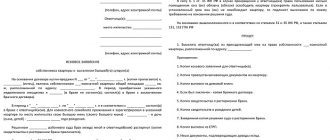How to discharge a convicted person from an apartment?
There are two ways to cancel the registration of a person in prison:
- If he has his consent. This is the easiest way to solve this issue. To do this, you will need to contact the passport office and provide the necessary package of documents.
- If the prisoner refuses to carry out the discharge procedure. This often happens when the prisoner is in a tense relationship with the people who want to release him. In this case, the procedure will be somewhat more complicated, but it is still possible.
In the second case, registration can be canceled only through the court. This is regulated by Article 7 of the Law of the Russian Federation No. 5242.
Also an important factor influencing the deregistration procedure is the type of housing and the rights of the convicted person to it.
De-registration options
There are two options:
- in agreement with the person serving his sentence;
- without approval.
The first method is quite realistic and is suitable for those who maintain normal human relations with the person in custody, but want to pay utility bills only for citizens who are actually currently living in the residential premises.
The second option is possible if the housing is in municipal ownership, and the trial has already taken place and the decision has gained legal force.
In this case, the registration will be canceled, but only for the period of the prison term.
In general, there are a lot of situations, and the subtleties of legal procedures depend on the status of the convicted person (in relation to property rights to housing and the degree of relationship), as well as on whether the person participated in privatization or refused it, etc.
In the vast majority of cases, discharge is possible only through the court (Article 7 of the Law of the Russian Federation No. 5242-1 of June 25, 1993).
You can learn about how to apply for an extract from an apartment through the MFC or the State Services portal, as well as what documents are required for the procedure.
Procedure
Below we provide a detailed algorithm of actions that need to be carried out for discharge in two situations - if the convicted person agrees to be discharged and if not.
By consent
When contacting the passport office to terminate the registration of a prisoner, you must submit the following documents to the specialist:
- Identification document of the person being deregistered. This is a copy of the convict’s passport, certified by the seal of the correctional institution and the signature of the chief.
- An application filled out on a special form and certified in the same way as a copy of the passport. The form can be obtained from a passport office employee. Anyone can fill out the application directly, but the convicted person must personally sign it. To do this, you will have to visit the institution where he is serving his sentence.
- A copy of the verdict. The procedure for obtaining a copy is quite complicated. It can be obtained both from the convicted person and from the court that made the decision. It may be difficult to obtain it in court. since the court issues a verdict only to the participants in the process.
All documents are submitted to a single window of the Department of Internal Affairs of the Ministry of Internal Affairs of the Russian Federation for the reception of citizens.
Authority employees may require the personal presence of the person being discharged. Such actions are illegal and should be appealed in court.
After your application, the passport office employees must cancel the registration of a person imprisoned in the MLS within no more than three days.
Without agreement
When applying to the court to unilaterally discharge a person who is in MLS, you need to perform the following series of actions:
- File a claim. The best option for this would be to contact a qualified lawyer. A specialist will help you fill out your application and advise you on any questions you may have. But you can do this yourself.
- Attach the necessary documents to it: a copy of the verdict, an extract from the house register, a copy of the passport of the person being discharged, a copy of your passport, a certificate of home ownership or a social tenancy agreement;
- Appear in court to participate in the hearing. The court, based on the facts presented and the documents provided, will consider the case and make a decision. It can be either positive or not satisfying the plaintiff’s demands.
- After receiving a satisfactory decision from the judicial authority, contact the department of the Internal Affairs Directorate of the Ministry of Internal Affairs of the Russian Federation at the place of residence of the convicted person to make changes to the register of residents.
Where can I get a copy of the sentence of the convicted person?
A copy of the verdict may be needed to deregister at your place of residence or stay. According to Art. 312 of the Code of Criminal Procedure of the Russian Federation, it is issued within 5 days from the date of proclamation of the verdict to the convicted, acquitted or his representative, as well as to the victim. A copy is issued to both civil plaintiffs and defendants upon petition.
To obtain a copy of the verdict, you need to contact the court that issued it with an application.
Legal advice: The easiest way to obtain a copy is through the lawyer who represented the interests of the convicted person or victim. You need to ask him about this, explaining why the document was needed.
Elena Plokhuta
Lawyer, website author (Civil law, 7 years of experience)
Contents and sample application
An application for a copy of the judgment must be submitted in writing; a sample will be issued in court.
What information is indicated in the application:
- Name and address of the court.
- Full name, address, telephone number of the applicant.
- Date of pronouncement and details of the verdict.
- The number of the case in which the verdict was issued.
- FULL NAME. convicted person or other participant in the proceedings.
- Date of compilation and signature of the applicant.
Sample application
Consultation on document preparation
Are you tired of reading? We’ll tell you over the phone and answer your questions.
Discharge procedure
When discharged by consent, all persons who have the right to own housing must appear at the migration authority at the place of residence. In addition to submitting documents, each owner will need to write an application requesting the discharge of the convicted person.
Completing the procedure does not involve paying a state fee or any other additional services. Due to the fact that the original passport of the arrested person is missing, a mark indicating cancellation of registration will be placed on a certified copy of the document. Deregistration can be carried out within three working days.
After completing the procedure, information about the discharge will be in the database. If you request an extract from the house register or an apartment card, then the person serving a sentence in the MLS will not be noted in it.
At the end of the sentence, the person will be able to restore permanent registration in the apartment or house.
The procedure for deregistration without the consent of the arrested person takes place in two stages:
- submitting documents to the court to consider the case on the merits of the issue;
- contacting the passport office at your place of residence to cancel your registration.
It is not necessary to provide a copy of the verdict when applying to court. The court will independently make a request for the necessary document.
The court will make a decision based on the facts and documents provided. Having received a positive decision, you must submit it to the passport office along with the following documents:
- Copies of identification documents of home owners (copies of passports).
- Applications from each person who has ownership rights to the apartment.
- A copy of the prisoner’s passport certified by the relevant institution.
- A copy of the sentence under which the person is serving the sentence.
After completing the application, the authority’s employees will cancel the arrestee’s registration.
The convicted person agrees to be deregistered
Privatized apartment
If a prisoner who is in prison has a good relationship with his family, then he himself will want to save his loved ones from unnecessary utility bills. Then the relatives need to take an application form according to Form No. 6 from the passport office and bring it to the place of deprivation of liberty.
The convicted person fills out an application, writes a power of attorney with the authority to leave the apartment, makes a copy of the passport and has all three documents certified by the administration of the correctional institution.
IMPORTANT! The colony management has no right to refuse to certify documents.
It is also necessary to have a copy of the court verdict in hand. The easiest way to get it is from the ZK himself or his lawyer. If this is not possible, then there are two ways:
- contact the judge himself or his assistant, explain the situation and ask for a copy;
- submit an application to the court with a request to issue a copy of the verdict, justifying your request by the fact that the citizen must be deregistered.
With these papers, the prisoner's relatives can return to the passport office. This is where difficulties sometimes begin. Due to the 2015 amendments to Order No. 288, the discharge of a prisoner without trial became possible only with his direct participation.
However, nowhere in the Order does it say that direct participation is the personal presence of a citizen at the passport office. This means that participation can be expressed in writing a power of attorney in the name of another person.
ATTENTION: If passport office employees refer to the 2015 amendments and refuse to discharge a person without his personal presence, it is important not to give up - demand from the employee a written refusal explaining the reasons, say that you plan to appeal this refusal to the prosecutor's office, this usually helps.
Municipal apartment
If the apartment is municipal, then the tenant can be discharged when he is sent to prison only for the period of “serving”. Article 71 of the Housing Code of the Russian Federation states: “the temporary absence of a tenant of residential premises under a social tenancy agreement does not entail a change in the rights and obligations under the social tenancy agreement.”
If during the period of imprisonment relatives managed to exchange one public housing for another, then the released citizen will be registered in the new place. And if relatives managed to privatize and sell the square meters, then buyers will be in for a surprise - the former prisoner may well claim their rights to residence.
You can find more information about the nuances of being discharged from municipal housing in various situations here.
How to fill out the application form for Form No. 6?
The form is divided into two parts, the upper one is needed to register a person, we leave it blank.
The prisoner fills out on his own behalf the lower half under the heading “Application for deregistration at the place of residence.”
Wherever an address is asked, you must remember to write the name of the city. The first line indicates the registration authority, that is, the passport office where the check-out will take place.
ATTENTION: The “Legal Representative” column remains empty. In the column “In connection with registration at a new place of residence at the address,” the address of the correctional institution is required, including the number of the barracks or cell where the convicted person lives.
Immediately after this comes the column “Registration Authority”, in which the address of the administration of the correctional institution is written.
Application form according to Form No. 6
How to write a claim?
To correctly draw up a statement of claim, it is better to use the services of a professional lawyer. However, you can try to file a claim yourself. The claim is drawn up in printed form or by hand in triplicate. When writing by hand, use only black or blue ink. You can learn the general rules for filing an eviction claim from this article.
The header of the application should indicate:
- the full name of the judicial institution to which the appeal is made;
- last name, first name, patronymic of the plaintiff and his full address of residence;
- information about the defendant in the same form as information about the plaintiff.
The text of the application must describe in detail the circumstances of the controversial situation and list the attached documents. The following are the requirements that the applicant believes the court must satisfy. The statement of claim must have the signature of the applicant and the date the document was drawn up.
Background
Even in distant Soviet times, the issue of discharge was resolved very simply. There was a certain period during which the registration of a given citizen was retained even though he did not live in this housing. The period was six months. After this, he could be discharged, since he lost the right to live in this living space. This happened regardless of the desire of the person who left and the reasons why he was not there, including when he was sent to prison.
True, there were exceptions for some people:
- service in the Armed Forces;
- long business trips related to the work performed.
If this is a prisoner serving his sentence in prison for six months or more, then the question of whether he is discharged is decided by eviction from the previously occupied living space. Over time, this was considered inhumane. The argument was that in fact, eviction if a person is in jail is an additional punishment to what was determined by the court.
Currently, the prisoner retains the right of residence while he is serving his sentence.
Of course, it can be deregistered in one way or another. However, after serving his sentence, he can usually restore his rights through the court. The eviction will continue as long as the inmate is in jail.
Price
A mandatory condition when applying to a judicial authority is payment of the state fee. It has a fixed amount and goes to cover the costs associated with the consideration of the case. The state fee must be paid before the process begins. The amount of state duty in 2021 in accordance with the Tax Code of the Russian Federation for individuals is 300 rubles, for legal entities – 6,000 rubles.
However, you have to spend money on making copies of documents, services of a notary, representative, and so on. Therefore, the full cost of the procedure is individual for each case.
Motivation
Why do you need to figure out how to sign a person out of an apartment? If he is in prison, then there may be a variety of reasons for this.
We recommend that you read:
Is it possible to sign a person out of an apartment without his consent?
- One of the most common reasons is financial. Nowadays, utility bills are quite high and paying for someone who does not currently live here may be too expensive. By achieving the release of a prisoner in prison, people will be able to reduce their utility costs to some extent.
- Other situations are also possible. For example, the court sentence was for a rather long period. During this time, life circumstances could well have changed a lot. In this regard, there may be a need to sell or exchange housing. When conducting such transactions, the presence of a prisoner registered in this living space who is in prison can significantly affect the circumstances of the transaction. In this case, it may also be that he himself will not object. However, even in this case it will need to be formalized properly. In addition, we must not forget: if a convicted person is discharged from his apartment, then upon returning from prison, such a citizen may, in some cases, demand that the transaction be declared invalid. Such fears are rarely justified, but new homeowners will still have some concern. And this, in turn, can affect the transaction price. If the tenants were not checked out during the sale, this could reduce the transaction price.
- Another common reason is that the convicted person may not be a very pleasant person to talk to and thus pose some kind of threat to those who live with him. In this case, it is quite expected that they may try to evict him from the living space he occupies.
Of course, these types of reasons may not be limited to the list given here. Only the most typical, most common of them were listed.
Features of the discharge procedure
The check-out procedure differs for different types of apartments. Let's look at what to do in case of deregistration from municipal and privatized apartments.
From a council apartment
In this case, the person who uses municipal housing under a rental agreement initiates the discharge. Cancellation of registration in such a situation is carried out while serving the sentence. After serving the sentence, the convicted person can restore his registration.
From a privatized apartment
In a situation with a privatized apartment, everything depends on what rights the person in the MLS has to this housing. If a person is the owner of an apartment, then he can be discharged only with his consent.
If the prisoner only has the right to reside, then his registration can be annulled in court. However, after returning from MLS, he will be able to restore it. Even after selling the apartment, he will have the legal right to live in it.
What will they give out?
Since the relative of the prisoner does not have the original passport in hand, and a copy was submitted, the stamp on deregistration at the place of former registration will be placed only on the second copy of the departure sheet .
This will be the result of the discharge.
If after this procedure you take a certificate from the place of residence , then the prisoner’s surname will no longer appear on it, since the deregistration operation has been carried out in the automated database and in all accounting papers.
Other nuances
Sometimes it happens that a convicted owner of a privatized apartment can be persuaded to voluntarily deregister. If after this the apartment is sold, then the person returning from prison will be able to cancel such a deal in court. The court will grant his request if the person claims that he signed the consent under duress.
It is worth considering that the state will not leave a person serving a sentence completely without a home. Upon returning from MLS, a person will be able to restore his registration. If during this time the tenants move from one municipal apartment to another, then he will have the right to live in this housing.
Example. Citizen Alexandrov registered an acquaintance, citizen Sazonov, in his apartment. At the time of registration, Alexandrov was the sole owner of the privatized housing. Some time later, citizen Sazonov committed a crime and was sentenced to imprisonment. Deciding to sign Sazonov out of the apartment, Aleksandrov turned to him, but he refused without explanation. Then Aleksandrov went to court with a demand to discharge the prisoner from his apartment. The court granted the claim. However, Sazonov retained the right to restore registration upon arrival from MLS.
That is why, when buying a house or apartment, you need to make sure that a convicted person does not have the right to live in it. This can be done by requesting an archival certificate about the composition of the seller’s family.
How to discharge a person who is in prison through State Services?
A convicted person or his representative (lawyer, jurist) can submit an application through State Services. It is enough to have a verified account on the portal.
What information is indicated in the application:
- Type of applicant: registered, representative of another person.
- Who is the applicant registered as: other.
- Personal data of the applicant.
- Passport details of the convicted person.
- Old registration address.
- New registration address (if any).
- The reason for deregistration is a conviction to imprisonment.
- Information about other citizenship (if any).
- Main reason for relocation.
- Information about work, education.
- Department for submitting documents (must be selected).
- Consent to the processing of personal data.
Once the application is completed, it must be sent for verification. The automatic check is carried out within 15 minutes, a notification with the results will be sent to your personal account. When it is checked at the Department of Internal Affairs of the Ministry of Internal Affairs, a notification will be sent to the applicant’s email with the date and time of personal submission of documents. If a lawyer is involved in this, in addition to the convict’s passport and a copy of the verdict, you will need a power of attorney certified by the head of the colony.
Features and nuances of the process
Although in short it looks quite simple, in reality there are many problems. This does not always happen, but you need to be prepared for this. There are some nuances to this issue .
If housing is privatized
The possibility of check-out in a privatized apartment is determined as follows::
- if the prisoner is the owner of the share, then he can be discharged at his own request, and if he is against it, only through the court.
- If he is not the owner, but during privatization he refused to formalize his share, then he can be discharged only with his consent.
- If privatization occurs while he is in prison, then he can be discharged only for the duration of his absence.
The apartment belongs to the municipality
This option is the simplest (more about this here). The court willingly considers such cases and issues a positive decision on them . There is just one condition: after returning, he can just as easily restore his rights.
And this will be possible even if the apartment has already been sold to other people. This gap in the legislation causes more problems for real estate buyers than for sellers.
The main feature that needs to be remembered is the need to clarify whether the relative is being discharged temporarily or permanently . Otherwise, there may be surprises that no one is prepared for. Clarify this point in court immediately, without waiting for the convicted person to return home.
If you find an error, please select a piece of text and press Ctrl+Enter.
In what cases is it necessary to discharge a person from housing?
Although in general one can note an increase in the legal knowledge of Russians, still not all property owners realize the seriousness of the situation. This is especially true for single people and pensioners. They easily respond to requests for help to register a relative or friend with them.
A common reason for eviction is divorce. The former spouses are unable to get along with each other, and the owner of the premises seeks to vacate the apartment from the person who has become an outsider. Often, together with the ex-husband, the owner tries to evict the children.
Sometimes complete strangers may be registered in an apartment, for example, when renting an apartment. Taking advantage of gaps in education, scammers move into housing and it becomes difficult to kick them out.
There are situations when a registered person has long changed his place of residence, but his registration remains the same. If contact with him is lost, or he refuses to check out, those remaining in the apartment have to deal with this issue.
Some properties are sold with registered persons. Sellers give a good discount, promising to pay when buying a new home. However, after the transaction they disappear, forgetting about their obligations.
This is just a small list of options when you need to deregister a person registered in an apartment. But even this shows the relevance of the issue.
How to act in this situation?
Deprivation of the right of residence occurs as follows:
- Initially, the apartment owner must be notified of the tenant’s problems and provide evidence;
- Write an appropriate statement of claim and collect the necessary documents;
- File a lawsuit and provide evidence;
- After the hearing, the court makes a decision on whether to discharge the citizen from the apartment.
A person cannot be evicted just because he has been absent for a long time, since this is not a basis for such an action. Although a decision may be made according to which municipal housing can simply be exchanged.
It's fast and free!
Or call us by phone (24/7).
- Forced discharge and eviction are the most painful housing issues. The law allows a person to be discharged only with his written consent. It happens that a tenant refuses to voluntarily check out of a premises that he may not actually occupy. There are also frequent situations when a citizen simply cannot appear at the passport office and express his consent. We will tell you what to do in this and other similar cases in the material presented.
How to discharge a person without his consent? In this case, the rights of the legal owner or responsible tenant will be protected by the court (Clause 1 of Article 35 of the Housing Code of the Russian Federation). The court decision is based on the documents provided by the plaintiff, testimony of neighbors, residents, representatives of law enforcement agencies, and other people who have information about the case under consideration.
Discharge of a tenant from an apartment without his participation is permitted if:
- registration at a different address;
- presence of a court decision;
- issuing a power of attorney from him.
Is it possible to discharge a person without his consent? This question concerns, first of all, the responsible tenant of municipal housing. The reason for his appeal to the court on the issue of forced deregistration may also be the intention to privatize the apartment without the person actually living in it, the reluctance or impossibility of further cohabitation with his ex-husband, wife, adult children, the desire to deregister former home owners who refused privatization.









